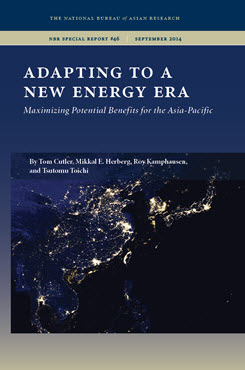Forging a New Strategy for U.S., Japanese, and Asian Energy Security
This is one of four essays in the NBR Special Report “Adapting to a New Energy Era: Maximizing Potential Benefits for the Asia-Pacific.”
EXECUTIVE SUMMARY
This essay argues that the U.S., Japan, and the rest of Asia need to develop a new, more collaborative energy security strategy in the wake of the U.S. unconventional energy revolution, rising Asian energy demand, and changes in the U.S. strategic posture.
MAIN ARGUMENT
World energy markets are undergoing seismic shifts as Asian energy demand and imports have risen dramatically and the U.S. unconventional energy revolution has radically reduced the need for imported energy. U.S. dependence on Middle East oil is disappearing, while Asian dependence is rising, especially for China. At the same time, the U.S. faces a war-weary American public, sharply reduced future defense spending, a need to shift strategic and diplomatic resources toward Asia, and a new and dangerously unmanageable situation in the Middle East in the wake of the Arab Spring. The combination of growing energy abundance and tightening strategic constraints raises the possibility that the U.S. could reduce some of its costly commitments to Middle East stability, increasing the risks of worsening instability and threats to the reliability of energy exports to Asia. It is, therefore, in the interest of Japan, China, and the rest of Asia to begin working together to forge a new, more collaborative energy security strategy in cooperation with the U.S. Nevertheless, this will be difficult due to the overlay of strategic rivalries and tensions in the region that make stronger regional cooperation on many issues a serious challenge.
POLICY IMPLICATIONS
- The U.S. and Japan should lead the creation of a new dialogue in Asia, including with China especially. The goal of this dialogue should be to find common ground and share the burden of security cooperation in order to ensure greater stability in the Middle East and the strategic security of energy production and energy sea lanes from the Persian Gulf to Asia.
- New efforts should also be made to forge new energy cooperation institutions in the Asia-Pacific that would strengthen regional energy security in the event of major supply disruptions from the Middle East. This should include new strategic oil stocks.
- Countries in the region also need to work together to strengthen energy markets and contracts, especially for LNG, in order to increase flexibility, transparency, and the ability to adjust more quickly to changing market conditions and potential supply shortages.
Mikkal E. Herberg is a Senior Lecturer in the Graduate School of International Relations and Pacific Studies at the University of California–San Diego and Research Director of the Energy Security Program at the National Bureau of Asian Research.


